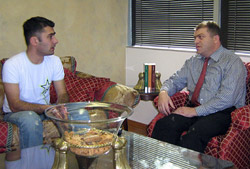It’s almost impossible to call the Armenian General Consulate based in Beverly Hills. The line is always busy. Just recently, the consulate brought a phone with many lines so that it can have the opportunity to serve the needs of the Armenian community of Los Angeles. The Armenian General Consulate serves Armenian citizens living in 14 states of the West coast of the U.S. and foreign citizens who are interested in coming to America.
The consulate is located on the same floor of the Armenian Assembly of America and the consulate itself is the last two doors on the second floor. There are only five workers, but it is expected to hire more workers in November. The newly appointed consul Armen Liloyan is coming from Yerevan. He is the cousin of famous Armenian journalist Tigran Liloyan. For the time being, the burden is on the shoulders of the deputy general consul Harutyun Kojoyan.
“The main problem that we have with citizens is that they don’t fully picture what the consul is and what it stands for. Some people think that if they have made the payment to the consulate, then the consulate will fulfill their needs. The consulate is not a store where you can buy whatever you want. The citizen makes the payment, which goes to the treasury, but that doesn’t mean that the given citizen must get a passport, a visa, etc. After all, the citizens that apply to the U.S. embassy don’t get visas and there is no refund. It’s different at the consulate. There are some cases-when the citizen is rejected for this or that reason, we take into consideration the social conditions of that citizen and give him back his money, although we have the right to keep the money,” says deputy general consul Harut Kojoyan.
There are nearly 10,000 Armenian citizens living in Los Angeles, but this is a non-official number. The citizens that have come during the Soviet era are not included in the list; they came and stayed. After the constitutional amendments of Armenia, there have been many calls for getting Armenian citizenship. According to Harut Kojoyan, the people interested in dual citizenship are the people from the Armenian Diaspora and people who have moved to the U.S. with a Soviet passport and are now U.S. citizens. Armenian-Americans only complain about the long documentation process. “The process takes longer than it takes for getting a passport because the passports are printed in Yerevan. We prepare the documents quickly. Besides that, we don’t have a postal system. There is no direct flight to Armenia from the consulate; that’s why we have some problems with sending information and mainly send the information via our citizens going to Armenia. Generally, we work operatively. If there is any complaint, then you have to bring up a certain reason.”
-Mr. Kojoyan, Armenian citizens who are tourists or are in the U.S. with a student visa apply for U.S. citizenship with the plead for political refuge. They even present videos and speeches about political persecution. U.S. courts consult with the consulate for getting additional information or news.
-That does happen and we can’t do anything about that because that deals with the U.S. immigration policy. If it’s a case dealing with the citizen, we don’t have anything to do with it. They keep us updated. If they are interested, we are ready to help. But we haven’t received such requests so far. They know what the situation is-they have to apply to the U.S. embassy. If it’s a criminal case and deals with the Armenian citizen, then the consulate always responds.
-Armenian Americans are spreading rumors about the Armenian mafia group in Los Angeles; a group that always has problems with the Mexicans.
-We don’t have such information. Once there was a gang called “Armenian Power”, which did have conflicts with the Mexicans. There are conflicts between Armenian and Mexican students because the students of those ethnicities mainly study in the schools of Los Angeles. Sometimes there are conflicts, but I don’t think that the conflicts happen based on nationality.

